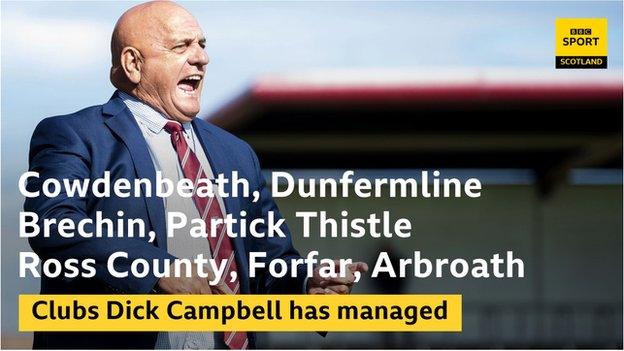Dick Campbell: Arbroath boss on how to survive 32 years as a manager
- Published
'Is it harder to manage Celtic than Arbroath?'
This will be Dick Campbell's 32nd season as a manager. He has taken charge of seven clubs, achieved 10 promotions and overseen more than 1300 matches around Scotland.
Next month, beaming from beneath his famous flatcap, Scottish football's oldest and most experienced boss will lead Championship underdogs Arbroath in their first second-tier season for 16 years.
"Never in my life would I have believed I was going to be a coach," says the 65-year-old. "I liked a pint and I liked a fag too much during my playing career..."
Here, Campbell tells BBC Scotland about living with former Rangers and Scotland boss Walter Smith, over-promoting younger men, and the heartache behind Arbroath's League One title win last season.
'Walter was in charge of our house'
Despite what he concedes was a rather underwhelming playing career - one which peaked at Cowdenbeath and Brechin City after serving his apprenticeship at Dundee United - Campbell made crucial friends along the way.
"Walter [Smith] was at United when I was there and 10 or 12 of us all lived in a house," he says with a wry smile. "Even then he showed leadership qualities. He was only 21 but he was in charge of everyone in the house. He made sure we all got to training on time, made sure we got home at a reasonable hour. And behaved ourselves."
After a knee injury cut his senior career short at the age of 30, Campbell returned to his home town to play for Hill of Beath Hawthorn. However, by that point, he was already a man in demand.
"I got a phone call from David Will at Brechin - who became vice-president of Fifa - asking if I'd reconsider retiring and coach the reserves," says Campbell. "I said I wasn't really interested, and he said it was a pity because [former Scotland manager] Andy Roxburgh and Craig Brown were really keen to get me down there. Then I got involved and started to like it. So then I became a staff coach."
From there, Campbell established and solidified relationships with some of the most influential members of the Scottish football firmament. "It helped me working with Alex Ferguson, Water Smith, Archie Knox, Jimmy Bone and Jocky Scott," he says. "I learned a lot from them. We've all remained friends, but these people will cut you in two. You can't get too big headed with them."

'We think younger managers can do it all... they can't'
Campbell comes from a generation of managers that viewed football management as a trade. A simple tool for working class men to make the most of life.
It's why he did an apprenticeship during his time at Dundee United and worked as a shipwright in the Forsyth dockyards after leaving Brechin, and why he still advocates the importance of young managers working as apprentices before taking a first team.
"We're the only trade in the world that gets rid of experience," he says of football. "What they do is take a player out of a playing environment and expect them to go manage people. They're just not learning their trade. I just think all the ones that fail are the ones that have been put in to a job where they've tried to put a square peg into a round hole."
Campbell might have a point. Last season, 25 of 42 managers in the SPFL lost their jobs - just under 60% - and last term the knee-jerk reaction was often to promote a former player with little-to-no managerial experience.
"In the last World Cup, 27 of the 32 teams had managers that were over 50," says Campbell. "But we seem to think a young manager can do it all. It doesn't happen."
This year, Campbell will be operating in a division that has four managers in their thirties, and the average age of his direct opponents stands at 21 years his junior. Yet the veteran is used to being overlooked and undervalued.
"I have my own thoughts on the whole thing," says Campbell, when asked if he gets enough credit for what he's achieved. "We are the only management team in the whole world that has taken two teams up two leagues. We took Brechin up two leagues and we took Arbroath up two leagues. Very few managers hit 1300 games. Nobody talks about it."
'Football gives you a lot of memories & broken hearts'

Dick Campbell, right, has had twin brother Ian at his side at most of his clubs
When talking about those successes, Campbell goes to great lengths to use the word "we'' rather than "I" or "me" because, according to him, his backroom staff are the real reason behind his success.
"I'm just very lucky that I've got good staff," says Campbell. "I don't do a thing. Seriously, I don't do a thing. I just walk in to that dressing room on a Saturday and say my piece."
Twin brother Ian, John Young and John Ritchie had remained constant pillars of support for Campbell - both professionally and as close friends - for the best part of 40 years. But Ritchie passed away last summer after a suffering with cancer, forcing the Arbroath manager to soldier on without his best pal and valued advisor.
"We dedicated the Championship win to John. I just miss him so much," says Campbell, before eulogising the man who helped him recover from his own cancer scare nine years ago.
"John and I used to walk every day around the meadows in Loch Hourn after my doctor told me I needed to get more exercise. We did that for three years and told the same stories every day. We used to sit in the back of John [Young] or my brother's car and the two of us would sit and listen to the two of them talk about tactics while we ate a bag of sweeties and reminisced about the laughs that we had.
"That's what football gives you - memories and a lot of broken hearts. A lot of happy times and a lot of sad times. But the jovial times outlive the bad times."
As he prepares for a season which Campbell believes will be the "hardest of his career", the elder statesman of Scottish football does not seem worried or intimidated. Where a younger, inexperienced coach may approach the campaign with overconfidence or blind naivety, Campbell has plenty of anticipation but nothing left to prove.
"When I look back at all I've done, I don't really care," says Campbell. "My accolades are all here for all to see. And they're there for my children to get when I'm no longer here. Maybe they'll recognise that their dad wasn't bad at what he did."